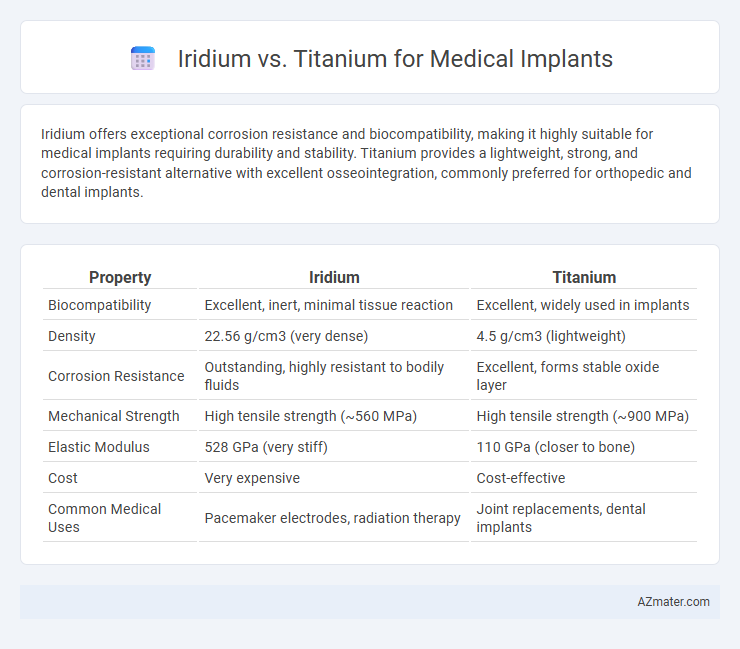Iridium offers exceptional corrosion resistance and biocompatibility, making it highly suitable for medical implants requiring durability and stability. Titanium provides a lightweight, strong, and corrosion-resistant alternative with excellent osseointegration, commonly preferred for orthopedic and dental implants.
Table of Comparison
| Property | Iridium | Titanium |
|---|---|---|
| Biocompatibility | Excellent, inert, minimal tissue reaction | Excellent, widely used in implants |
| Density | 22.56 g/cm3 (very dense) | 4.5 g/cm3 (lightweight) |
| Corrosion Resistance | Outstanding, highly resistant to bodily fluids | Excellent, forms stable oxide layer |
| Mechanical Strength | High tensile strength (~560 MPa) | High tensile strength (~900 MPa) |
| Elastic Modulus | 528 GPa (very stiff) | 110 GPa (closer to bone) |
| Cost | Very expensive | Cost-effective |
| Common Medical Uses | Pacemaker electrodes, radiation therapy | Joint replacements, dental implants |
Introduction to Medical Implant Materials
Iridium and titanium are prominent materials used in medical implants due to their exceptional biocompatibility and corrosion resistance. Titanium is favored for its lightweight nature, high strength-to-weight ratio, and excellent osseointegration properties, making it ideal for orthopedic and dental implants. Iridium, known for its extreme hardness and chemical stability, is primarily utilized in specialized applications like neural and cardiac implants where durability and precise electrical conductivity are critical.
Overview of Iridium in Medical Applications
Iridium is highly valued in medical implants due to its exceptional corrosion resistance and biocompatibility, making it suitable for long-term implantation without adverse tissue reactions. Its density and hardness provide structural stability, which is critical in devices such as pacemaker electrodes and neurostimulation probes. The metal's chemical inertness minimizes risk of ion release, preserving patient safety and implant integrity over time.
Titanium: The Gold Standard for Implants
Titanium remains the gold standard for medical implants due to its exceptional biocompatibility, corrosion resistance, and strength-to-weight ratio, which ensure long-term stability and patient safety. Its ability to osseointegrate with bone tissue promotes effective healing and implant longevity, outperforming many alternative metals like iridium. Medical-grade titanium alloys, commonly Ti-6Al-4V, provide enhanced mechanical properties essential for load-bearing applications, making titanium the preferred choice for orthopedic, dental, and cardiovascular implants.
Biocompatibility: Iridium vs Titanium
Iridium and titanium differ significantly in biocompatibility for medical implants, with titanium being widely favored due to its exceptional corrosion resistance and ability to form a stable oxide layer that minimizes immune response. Iridium, while highly corrosion-resistant and biologically inert, is less commonly used because it is denser and more difficult to process into implantable forms. Titanium's proven track record in osseointegration and minimal cytotoxicity makes it the preferred choice for long-term implant success.
Corrosion Resistance in Body Fluids
Iridium exhibits exceptional corrosion resistance in body fluids due to its noble metal properties, making it highly stable and biocompatible for long-term medical implants. Titanium, while also corrosion-resistant, relies on a stable oxide layer (TiO2) that protects against degradation but may be susceptible to localized corrosion in chloride-rich environments. The superior inertness of iridium reduces the risk of ion release and inflammation, whereas titanium's lightweight and mechanical strength offer a balanced compromise between corrosion resistance and implant durability.
Mechanical Strength and Durability Comparison
Titanium offers exceptional mechanical strength and corrosion resistance, making it a preferred material for medical implants requiring long-term durability. Iridium, while highly resistant to corrosion and biocompatible, has lower tensile strength compared to titanium, limiting its use in load-bearing implant applications. The superior fatigue resistance and lightweight nature of titanium enhance implant longevity and patient comfort compared to iridium-based components.
Radiopacity and Imaging Characteristics
Iridium and titanium differ significantly in radiopacity, with iridium exhibiting higher radiopacity due to its greater atomic number, enhancing visibility in X-ray and fluoroscopic imaging for medical implants. Titanium offers lower radiopacity but is favored for its biocompatibility and minimal imaging artifacts, making it ideal for MRI and CT scanning environments. Choosing between iridium and titanium depends on the implant's required imaging clarity and compatibility with diagnostic modalities.
Cost and Availability of Iridium and Titanium
Titanium is widely preferred for medical implants due to its high biocompatibility, corrosion resistance, and relative affordability, with costs significantly lower than iridium. Iridium, while extremely biocompatible and corrosion-resistant, is much rarer and substantially more expensive, limiting its availability and practical use in common medical implants. The high market cost and scarcity of iridium make titanium the economically and logistically favorable choice for large-scale implant production.
Clinical Applications and Case Studies
Iridium and titanium are widely used materials in medical implants due to their biocompatibility and mechanical properties, with titanium favored for orthopedic and dental implants owing to its excellent osseointegration and corrosion resistance. Clinical applications highlight iridium's use in radiotherapy seeds and pacemaker electrodes, leveraging its radiopacity and durability in high-radiation environments. Case studies demonstrate titanium's superior long-term performance in load-bearing implants, while iridium's niche applications provide enhanced functionality in cardiovascular and cancer treatment devices.
Future Trends in Medical Implant Materials
Iridium and titanium remain prominent in medical implants due to their biocompatibility and corrosion resistance, with titanium favored for lightweight strength and iridium for radiopacity in imaging. Emerging trends show a shift towards surface modification techniques on titanium to improve osseointegration and antibacterial properties, while iridium alloys are being explored for enhanced durability in high-stress implants. Advances in nanotechnology and biomimetic coatings are expected to redefine implant materials by combining titanium's mechanical advantages with iridium's imaging benefits for more personalized and long-lasting medical solutions.

Infographic: Iridium vs Titanium for Medical Implant
 azmater.com
azmater.com